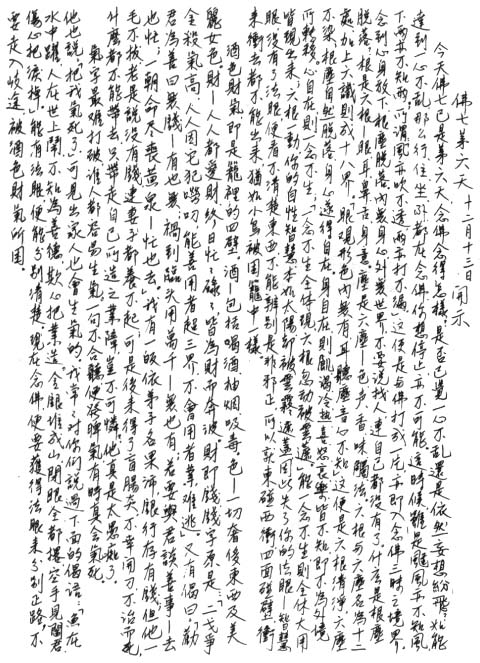|
Dharma Talks December 13, 1972 Day #6 Continued from issue 49
Today the Buddha recitation session has already reached the sixth day. How is your recitation of the Buddha's name progressing? Have you reached the point of undistracted single-minded concentration, or do you still experience furious flurries of fantasy? If you can arrive at undistracted single-minded concentration, then walking, standing, sitting, and lying down you reside in mindfulness of the Buddha. At such times, when your thinking ceases, even in the midst of a storm you are unaware of the blowing wind and oblivious to the beating rain. There is a saying, "The gales of wind can't penetrate and the driving rain can't leak in." Being thus, you are similar to the Buddha and have entered the state of the Buddha Recitation Samadhi. You have relinquished your mind and body, and the organs and objects have been cast aside. Within there is no body and mind, outside there is no world. At this time not only will you not be aware of other people, you won't even know yourself. Everything vanishes. "What is meant by casting aside the organs and objects?" The organs refer to the six sense organs: the eye, ear, nose, tongue, body and mind. The objects refer to the six objects of the senses: forms, sounds, smells, tastes, touchables, and dharmas. Adding the six consciousnesses, which arise between the sense organs and their objects, completes the eighteen realms, while the six organs and six objects alone combine to make the twelve sense fields. "The eye sees forms while inside there are none. The
ear hears sounds, which the heart does not perceive." "When not a single thought is produced, the total substance appears. When the six organs suddenly move, one is enveloped by clouds." If one can refrain from producing a single thought, the great function of the entire body comes forth. If the six sense organs move, the wisdom of your self-nature, which basically shines like the sun, becomes shaded by a covering of clouds and you lose your Selective Dharma Eye, without which you cannot see clearly, and are unable to distinguish right, wrong, deviant and proper. When this happens, no matter which way you turn you are obstructed, and you bump against the east and crash into the west. As if imprisoned on all four sides you sleep colliding coming and going, and can't get free, just like a bird trapped in a cage. Intoxicants, beautiful forms, riches, and anger are the four wails of this cage. Intoxicants include cigarettes and drugs as well as alcoholic beverages. Beautiful forms include material objects as well as those of the opposite sex. Riches
are something everyone enjoys. Day in and day out the major preoccupation of the
vast majority is how to get more wealth. Their whole existence centers around
the accumulation of money, the pursuit of which keeps them racing about and
spinning in circles. The Chinese character for money Advised to donate to charity, he has no money--he has but won't use it. But when an accident occurs he will send thousands--which he may not have but somehow gets. If one mentions joining in a beneficial activity--he 'd go but he's too busy. Yet on the day he dies and enters the grave despite his business he has to go! I had a disciple named Kuo P'ei who had a substantial amount of money in the bank but wouldn't part with so much as a hair on his head. He invariably said he didn't even have enough money to support a wife and family and so remained a bachelor. Eventually he developed appendicitis and had an operation, but the attack proved fatal. When he died he couldn't take a bit of his money with him. The only things he took along were his karmic obstacles. Isn't this pitiful and stupid? Anger is hard to combat. Everyone gets angry. People all have tempers and some even get so mad it kills them. I have often quoted the following gatha for you: Fish in the water jump about, People in the world clamor. Knowing they should perform kind acts They steel their hearts and continue to make bad karma. Piling up gold and silver high as a mountain, When they die the whole thing's over; They go before King Yama empty-handed Weeping with regret. Do you remember this poem? If you have the Selective Dharma Eye you can discriminate very clearly. Now by being mindful of the Buddha we wish to obtain the Selective Dharma Eye so that we can distinguish the proper path and avoid the wrong road which is surrounded on all four sides by intoxicants, beautiful forms, riches, and anger. This is very important.
|
